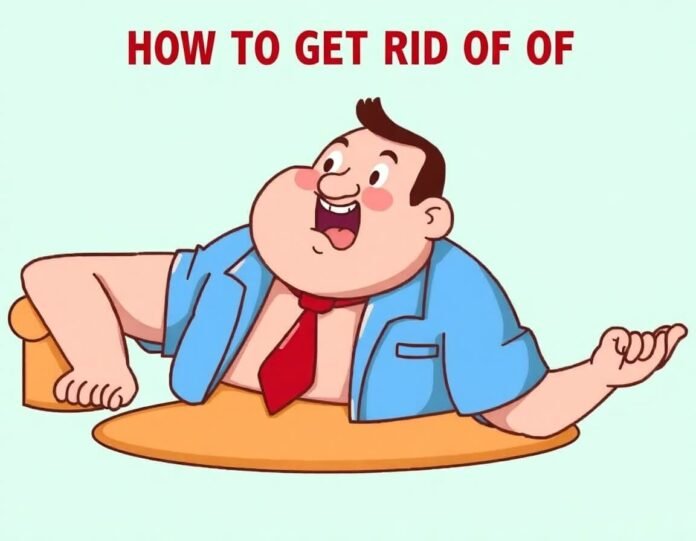If you’re wondering how to eliminate FUPA, you’re not alone. FUPA (Fat Upper Pubic Area) is commonly used to describe excess fat in the lower abdomen, just above the pubic bone. This area can be challenging to target, but with the right approach, you can work towards a flatter, more toned lower belly. This article will explore practical strategies to help you eliminate FUPA, from exercise and diet tips to lifestyle changes that can significantly impact you.
What is FUPA?
FUPA is the extra fat accumulating in the lower belly region, often contributing to a protruding appearance. It can affect both men and women and is typically the result of factors like weight gain, hormonal changes, pregnancy, aging, or even genetics. While it’s normal to have some fat in this area, excessive fat accumulation can lead to discomfort and affect one’s self-esteem.
Common Causes of FUPA
Understanding the reasons behind FUPA accumulation can help you effectively target the issue. Here are some of the most common causes:
- Weight Gain: Excess weight, especially around the abdominal region, can lead to forming a FUPA. This can be due to overeating, lack of exercise, or a sedentary lifestyle.
- Hormonal Changes: Hormonal fluctuations, especially in women, can increase fat storage around the lower abdomen. This is common during pregnancy, menopause, or even puberty.
- Genetics: Your genetic makeup plays a significant role in determining where your body stores fat. If your family has a history of carrying extra weight around the abdomen, you may be more likely to develop a FUPA.
- Age: As you age, your metabolism naturally slows down, making it easier to gain weight, particularly around the stomach and lower abdomen.
- Pregnancy: Pregnancy can stretch the skin and abdominal muscles, accumulating fat in the lower abdomen. After childbirth, this area may not return to its pre-pregnancy shape without effort.
- Poor Diet and Lack of Exercise: An unhealthy diet high in processed foods, sugar, and unhealthy fats, coupled with a lack of physical activity, can lead to overall weight gain, including a FUPA.

How to Get Rid of FUPA: The Best Strategies
Now that we know what FUPA is and what causes it, let’s explore actionable tips for reducing fat in the lower abdominal area.
1. Adopt a Healthy Diet
A balanced and healthy diet, including FUPA, is one of the most effective ways to reduce fat. While spot reduction is impossible (meaning you can’t target fat loss in a specific area), losing overall body fat will help reduce fat in your lower abdomen. Here’s how to optimize your diet:
Focus on Whole Foods
Eat various whole foods, including vegetables, fruits, lean proteins, whole grains, and healthy fats. Foods like leafy greens, berries, nuts, seeds, and fatty fish like salmon can help support fat loss.
Limit Processed Foods and Sugars
Processed foods and sugary snacks contribute to weight gain, especially around the belly. Refined sugars and carbohydrates spike insulin levels, which can lead to fat storage. Try to minimize your intake of sweets, sugary drinks, and refined grains like white bread.
Control Portion Sizes
Sometimes, not just what you eat but how much you eat that matters. Overeating—even healthy foods—can lead to fat accumulation. Use smaller plates, be mindful of portion sizes, and avoid eating late at night to help reduce overall calorie intake.
Stay Hydrated
Drinking plenty of water is essential for fat loss. Sometimes, your body can mistake thirst for hunger, leading to overeating. Staying hydrated also helps your metabolism run more efficiently, supporting your efforts to burn fat.
2. Incorporate Cardiovascular Exercise
Cardiovascular exercises are a great way to burn calories and reduce overall body fat, including the fat stored in the lower abdomen. Here are some effective forms of cardio:
Running or Jogging
Running or jogging is a classic cardio workout that helps burn many calories. Aim for 30 minutes of moderate-intensity running three to five times a week.
Cycling
Cycling is another excellent cardio workout that engages your legs and core while helping you burn fat. You can bike outdoors or use a stationary bike at home or the gym.
Swimming
Swimming is an excellent full-body workout that increases calorie burn and tones muscles. It’s also easy on the joints, making it a fantastic option for those with joint pain or other limitations.
High-Intensity Interval Training (HIIT)
HIIT involves alternating between short bursts of intense exercise and periods of rest or low-intensity activity. It is extremely efficient for burning fat and improving cardiovascular health.
3. Strength Training for Fat Loss
While cardio helps burn calories, strength training (or weightlifting) helps build muscle mass, increasing your resting metabolism and promoting fat loss. Focus on full-body strength training exercises that target multiple muscle groups at once, such as:
- Squats
- Deadlifts
- Push-ups
- Lunges
- Planks
Additionally, abdominal exercises like leg raise, Russian twists and bicycle crunches can help tone your core and lower abdomen muscles. However, remember that core exercises alone won’t eliminate fat in the area. It would help if you combined them with overall body fat loss.
4. Focus on Core Exercises
While you can’t target fat loss in a specific area, strengthening your core can help tighten and tone the muscles around your abdomen. This can lead to a flatter and firmer appearance over time. Incorporate the following exercises into your routine:
- Planks: Hold a plank position for 30-60 seconds, focusing on engaging your core.
- Mountain Climbers: Start in a push-up position and alternate, bringing your knees to your chest at a fast pace.
- Bicycle Crunches: Lie on your back, bring one knee toward your chest, and twist your torso to get the opposite elbow toward that knee—alternate sides.
5. Manage Stress and Sleep
Stress and poor sleep can contribute to weight gain, especially in the abdominal region. Stress leads to higher cortisol levels, a hormone that encourages fat storage in the belly. Poor sleep, on the other hand, can disrupt your metabolism and increase cravings for unhealthy foods.
Try mindfulness techniques like meditation, deep breathing, or yoga to reduce stress. Additionally, aim for 7-9 hours of sleep each night to allow your body to recover and regulate its hormones.
6. Consider Non-Surgical Treatments
Sometimes, people may choose non-surgical treatments to address stubborn fat in the FUPA area. Here are a few options:
- CoolSculpting: This non-invasive procedure freezes and destroys fat cells in targeted areas.
- Radiofrequency Treatments: These treatments use heat to break down fat cells and tighten the skin.
- Liposuction: A more invasive option, liposuction removes fat from specific areas of the body, including the lower abdomen.
These treatments may be effective but are not substitutes for a healthy diet and regular exercise. Consult with a healthcare professional to determine whether these options suit you.
7. Be Patient and Consistent
Getting rid of FUPA takes time and effort. It’s essential to stay consistent with your diet and exercise routine. Remember, the key to fat loss is creating a calorie deficit—burning more calories than you consume. You will start seeing results if you’re consistent with your healthy habits.
Conclusion
If you want to learn how to get rid of FUPA, it’s essential to understand that there’s no quick fix. Healthy eating, regular exercise, strength training, and lifestyle changes can help you achieve long-term fat loss. Focus on overall body fat reduction and toning your core, and you’ll notice improvements in the appearance of your lower abdomen.
By staying committed to your fitness goals and being patient with your progress, you’ll be well on your way to reducing FUPA and feeling more confident in your body.
you may also “Is TheraBreath Good? Uncover Oral Health Benefits

